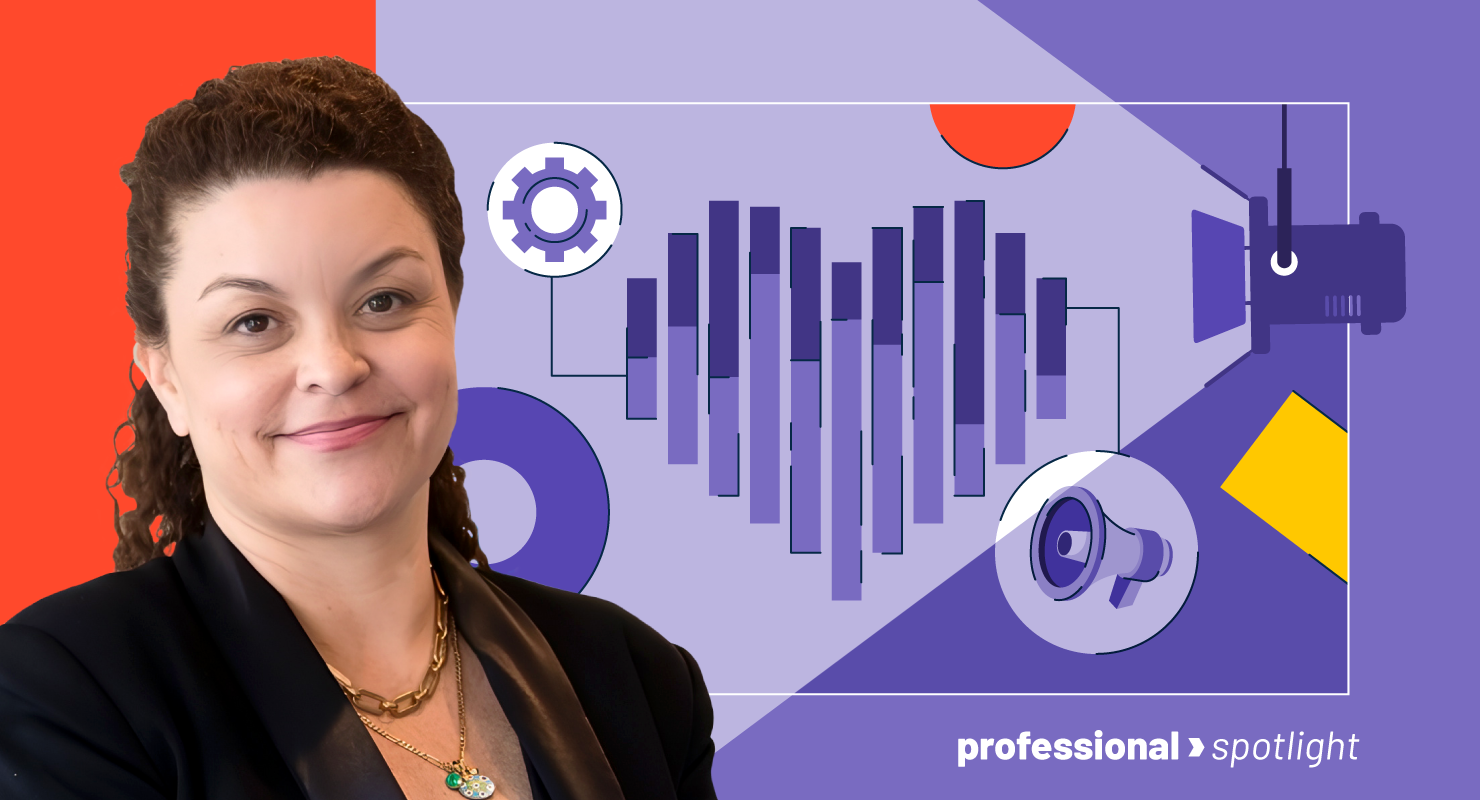October 30, 2024
 by Kamaljeet Kalsi / October 30, 2024
by Kamaljeet Kalsi / October 30, 2024

Change is hard. Just as the Grinch initially loathed Christmas, transformation can feel daunting in the fast-paced Whoville of marketing. But once you overcome this massive hurdle, you experience a transformative character arc as a leader and as an organization.
Today's marketing leaders strive to drive meaningful change and engagement within their industries. They aim to challenge existing perceptions and behaviors. After all, aren’t these the keys to success in today’s dynamic landscape?
Enter Ana Mourão, whose journey from economist to seasoned CRM and MarTech leader embodies the essence of transformative growth and strategic brilliance. She has mastered the art of digital transformation, experimentation frameworks, data-driven decision-making, and cross-departmental collaboration.
Ana has a winner’s appetite, possesses incredible business acumen, and has intriguing foresight into AI’s impact on MarTech and CRM.
This interview is part of G2’s Professional Spotlight series. For more content like this, subscribe to G2 Tea, a newsletter with SaaS-y news and entertainment.
What's your favorite beverage?
Mango-flavored lemonade.
What was your first job?
For my first job, I was an intern in a nonprofit program funded by the Brazilian government. It aimed to expand Brazilian software exports to North America, Asia, and Europe. I was part of a team that reviewed business plans for approval, incubation, and support.
What's your favorite software in your current tech stack?
Customer data platforms (CDP) because unifying data is crucial. These platforms provide a comprehensive view that is essential for understanding end users.
What problems at work make you want to throw your laptop out the window?
The biggest challenge for me is changing paradigms. I'm working with marketing technology in an older company that's transitioning digitally. It's like building a car while driving it. This requires us to rethink processes, which can be frustrating because although there's potential to improve, people often resist by saying, “We never did it that way.” It's not the technology that's challenging — it's changing processes and perceptions.
Kamaljeet Kalsi: Can you tell us a little about yourself and your professional journey?
Ana Mourão: I'm originally from Brazil and have lived in South Florida while building my digital marketing career in the US for about 15 years. Although trained as an economist, my interest shifted to digital marketing because it involves data-driven decision making and understanding complex systems.
I started with an internship in a Brazilian software project in Florida, which led me to stay here and develop my career. I work mainly as a digital marketing manager and generalist, as I believe in interconnected disciplines. Over time, my focus has shifted to customer data and CRM.
How has your Brazilian heritage and international experience enriched your professional journey in corporate America?
My Brazilian heritage, which I'm proud of, has significantly influenced my professional journey in corporate America. In Brazil, we often face numerous constraints, such as limited budgets and other challenges, which require us to be very creative. This environment has taught us to be resourceful and 'MacGyver' our way through problems.
We focus on creating minimal viable products, starting small, and testing them, which is often a more agile approach. This mindset is quite beneficial in corporate settings here, allowing us to be scrappy and adapt quickly without needing large teams or extensive approvals. It's a strength I believe many Brazilians and other Latin Americans bring to the table in the corporate world.
“My experience, paired with my heritage, enables me to foster collaboration in the workplace. It helps recruit and support diverse talent to join a new process because I'll be there with them — that's my skin in the game.”
Ana Mourão
Digital Marketing Leader
How can teams work better with CDPs across multiple geographies? Can you share some personal examples?
Certainly! One of the biggest advantages of using a CDP across multiple regions is that it provides a common baseline, making it easier to compare data between countries like Brazil, Indonesia, Mexico, and Canada.
Previously, compiling information from various markets and agencies was challenging, but now we can directly compare metrics and strategies to identify what works best. For this to be effective, governance is crucial. In my experience with a global organization, we developed a data contract that everyone adheres to, ensuring that data entering the CDP is as clean and correctly formatted as possible. This facilitates the swift and automatic ingestion, processing, and unification of data, allowing us to activate it seamlessly for marketing campaigns.
Once a campaign is set up following this data contract, the data flows into the CDP automatically and is ready for use, eliminating manual concerns. This shared responsibility among stakeholders ensures that the data is of high quality from the outset, which is vital for utilizing it to drive business objectives and revenue efficiently.
I believe this approach is often underappreciated but absolutely fundamental in working effectively with CDPs worldwide.
Given the challenges of data diversity across multiple geographies, how did you strategically implement a common baseline with the CDP? What were the key steps to ensure data integrity and relevance in targeting for different markets?
To effectively manage data across multiple regions, we began by defining how we intended to use this data, which led us to implement a CDP.
Initially, we were in search of a data repository but realized our needs were more aligned with marketing-related queries, such as understanding user engagement and behavior. The CDP then became essential for us to address these questions and facilitate data activation for our campaigns. We prioritized collecting only necessary data points that align directly with our marketing content, ensuring relevant and actionable personalization for end users.
This approach allowed us to build a more efficient data structure, adaptable to different markets and brands. By maintaining a solid base and customizing as needed, we avoided chaos and ensured smooth data processes. This strategic focus — tailoring the data collection to our needs and establishing clear data templates — enabled us to automate data ingestion, processing, and utilization.
We have gained valuable insights through collaboration with our global customer insights team. By conducting in-depth surveys and focus groups, we could dive deeper into understanding customer behavior, such as how professionals in different markets engage with our emails.
These insights challenged our previous assumptions, leading us to focus more on educational content rather than solely product-centric messaging. The feedback was critical in connecting our offerings to broader solutions, enhancing how our products are perceived and utilized in everyday tasks.
In most of your roles, you’ve had to work with multiple stakeholders to deliver results, which requires a thick skin and a delicate knack for managing relations. Can you tell us how you champion cross-team collaboration?
My experience as a generalist digital marketing manager has been invaluable in understanding how different teams work and should work together. I focus on empathy, putting myself in others' shoes to acknowledge the challenges of adapting to new ways.
As a leader and colleague, I'm right there with you, working side by side. I won’t step in without understanding how things work and start dictating changes. That's just not who I am. I've been in the trenches, and if there's something I don't know, I'll make sure to connect with the right person to find the answer quickly. This hands-on, collaborative approach is what I bring to the table in negotiations with stakeholders.
I lead by participating in the work alongside my colleagues, which helps build trust and demonstrates commitment. It's crucial to realize that pushback is not personal; it's often due to the complexities and challenges of change. I start difficult conversations with stakeholders by suggesting incremental changes and proof-of-concept projects.
For instance, we began our CDP initiative with a proof of concept in three markets, showing tangible results that helped visualize success. This approach builds momentum gradually and clarifies objectives for everyone involved, fostering collaboration across different teams.
What role do you think empathy plays in connecting CMOs, customers, and marketers?
Empathy is crucial in understanding what truly matters to customers. It's about putting yourself in the customer's shoes to grasp their real needs. There's a popular saying that customers aren't buying a drill; they're buying the ability to make a hole. This illustrates the importance of understanding the underlying desires of customers rather than just focusing on the products themselves. By leading with empathy, organizations can align their offerings with customer needs more effectively.
Tip for cultivating empathy for stronger customer-centric marketing:
Integrate empathy as a foundational element of your organizational culture. Prioritize understanding your customers' needs by putting yourself in their shoes. Use focus groups and similar strategies as tools to gain deeper insights into how your products or services fit into their lives. By embedding empathy into your company’s ethos, you’ll not only create more effective marketing strategies but also foster a customer-centric environment that drives long-term loyalty and success.
Data supports this empathetic approach, allowing businesses to test hypotheses, develop proof of concepts, and ensure they're addressing real customer wants and needs. This combination of empathy and data leads to more informed and resonant marketing strategies. Modern marketing technologies facilitate these processes, making it easier to implement tests, gather insights, and build a valuable knowledge base that informs future actions.
Can you share some actionable advice on how organizations can get their employees to follow data best practices?
It’s crucial to have shared objectives that align with the company’s overall goals and KPIs, not just individual team goals. If activities and data sources are siloed, data flow through the MarTech stack will be hindered and its value diminished.
“I also believe in implementing a balanced system of incentives and consequences.”
Ana Mourão
Digital Marketing Leader
We offer ease of use with our connected platforms as the 'carrot' — they simplify processes and automate tasks, making it almost effortless after initial setup.
For those who don't utilize these systems, the 'stick' is the added complexity and manual effort required without them. This 'help us help you' approach is key.
Additionally, automating workflows plays a significant role. By streamlining the entry and processing of data, teams can move from start to finish with minimal effort. Automation ensures efficiency and consistency, reducing the chance of errors and freeing up time for impactful activities. This approach has been successful, decreasing time to market and integrating seamlessly with existing processes.
As AI continues to reshape the marketing landscape, how do you envision it transforming CRM in the future, and which upcoming developments are you most eager to integrate into your CRM strategies?
I see AI playing a crucial role in maximizing the value of the entire MarTech stack. AI can facilitate automation across platforms, making processes seamless. For instance, a simple prompt like ‘How do I best qualify leads?’ can enable AI to analyze data, make decisions, and adjust strategies automatically, enhancing lead conversion rates.
AI can also help maintain and enforce data quality by overseeing campaign naming conventions and urchin tracking module (UTM) tags, ensuring compliance with governance standards. This would address data discrepancies by promptly correcting any misformatting.
“I'm excited about the potential of AI transforming CRM by governing data according to established data governance and contracts.”
Ana Mourão
Digital Marketing Leader
This capability is essential for preventing data quality issues even before the data enters the CDP, making it easier to process unified data that is ready for use. Although a lot of discussions focus on AI helping with customer communication, there's immense potential for AI to enhance backend processes, a side that marketers have yet to explore fully.
I think there will be a shift in the role of AI; it could evolve from being a tool managed by humans to becoming a system that actively governs or manages data itself. Do you foresee the same?
Exactly, it certainly can be. AI can also assist in governing data according to our data governance, or our data contract if you will. However, I see this as something marketers are not fully considering yet. There's a lot of discussion about AI on the technical side, but not so much in marketing technology. You often hear about AI helping with communication with the end user, but not yet on the backend.

Every Thursday, we spill hot takes, insider knowledge, and news recaps straight to your inbox. Subscribe here
How is AI transforming the creation of high-performing email marketing, and what are some secrets you would like to spill?
I believe that it's often underestimated how important it is to recognize that not all emails are the same. Some require custom, elaborate designs, while others are more transactional and suitable for templates. The key is to automate where possible, allowing for scalability, ensuring cadence, and maintaining engagement without eliminating the human element.
In the B2B environment, email communication is often bundled into a one-time-use package for specific campaigns, similar to print media or trade events.
However, unlike these, digital mediums, including email, can be repurposed and reused for ongoing success. This mindset shift toward leveraging automation and repurposing content more effectively is crucial and often underutilized. It's this understanding and strategic use of automation that I consider vital.
“Anything that is templated is primed for automation. If a package for product X sent to my email list proves successful, why not reuse and repurpose it? Understanding this is key to leveraging performance to the company's advantage.”
Ana Mourão
Digital Marketing Leader
In our recent report, 36% of surveyors said CRM software must, going ahead, have AI functionality. Which sphere of CRM do you see AI making the most impact in?
I see AI profoundly impacting CRM by taking on tasks such as lead qualification, optimizing sales channels, and troubleshooting campaign tracking. It’s like giving a simple prompt — ‘How can I better qualify my leads?’ — and AI takes it from there, processing data across the MarTech stack to make informed decisions automatically. This way, AI helps maximize our tool's utilization and ensures we're making the most out of every part of our process.
The beauty of AI isn’t about replacing human roles; it’s about freeing marketers to focus on creative and strategic aspects by taking over those everyday operational tasks. It’s about using AI as a supportive tool to make our operations smarter and more predictive.
Follow Ana (Almeida) Mourão to keep up with the latest in AI, MarTech, and data governance tactics.
If you enjoyed this insightful conversation, subscribe to the G2 Tea newsletter for the latest tech and marketing thought leadership.
Kamaljeet Kalsi is Sr. Editorial Content Specialist at G2. She brings 9 years of content creation, publishing, and marketing expertise to G2’s TechSignals and Industry Insights columns. She loves a good conversation around digital marketing, leadership, strategy, analytics, humanity, and animals. As an avid tea drinker, she believes ‘Chai-tea-latte’ is not an actual beverage and advocates for the same. When she is not busy creating content, you will find her contemplating life and listening to John Mayer.
Welcome to the new frontier of marketing, where creativity meets risk management, and AI is...
 by Tanushree Verma
by Tanushree Verma
For decades, marketers have thrived on a seemingly endless supply of user data. Third-party...
 by Washija Kazim
by Washija Kazim
Let's be honest. Not every business partnership clicks instantly. But when they do, they're a...
 by Tanushree Verma
by Tanushree Verma
Welcome to the new frontier of marketing, where creativity meets risk management, and AI is...
 by Tanushree Verma
by Tanushree Verma
For decades, marketers have thrived on a seemingly endless supply of user data. Third-party...
 by Washija Kazim
by Washija Kazim


